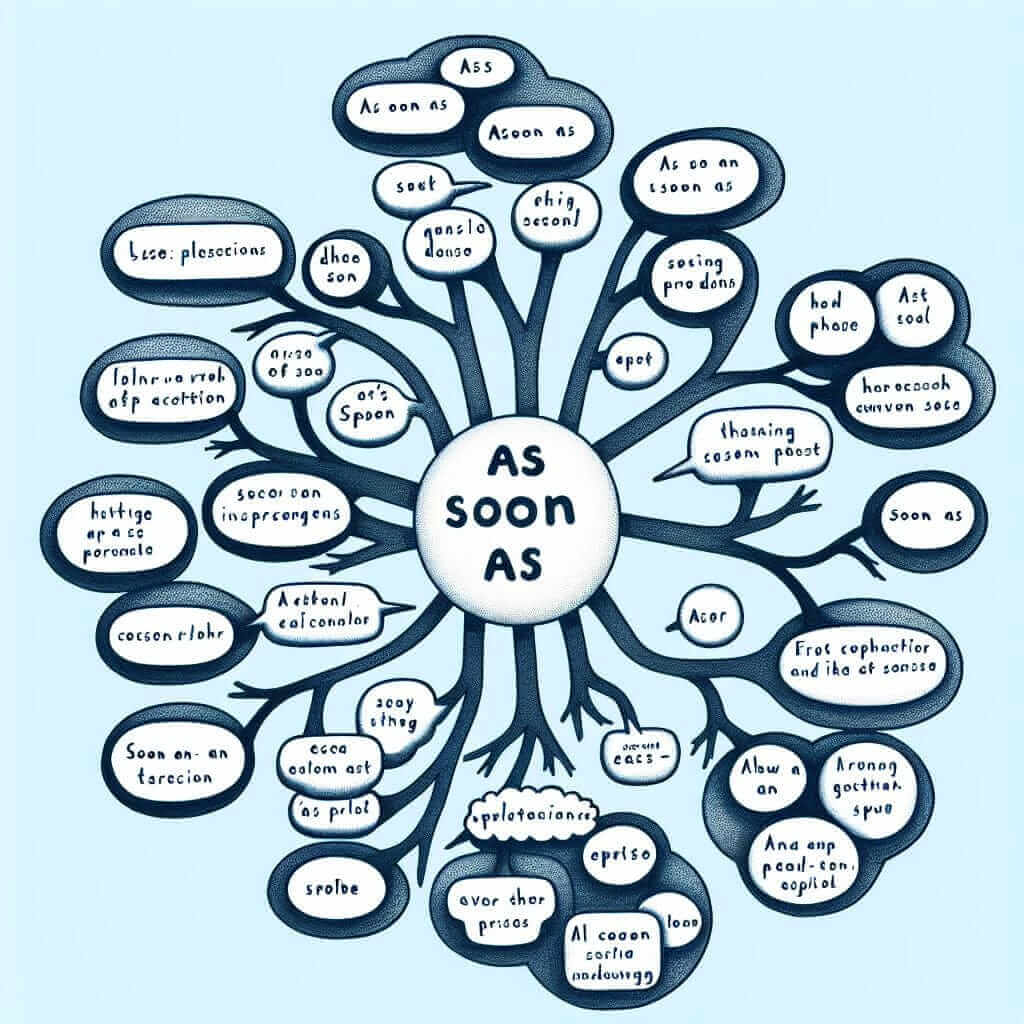The IELTS exam, particularly the Writing and Speaking sections, requires candidates to demonstrate a strong command of grammatical structures that go beyond the basics. One such structure that can significantly enhance your language proficiency is the use of “as soon as” for time reference. This phrase is not only handy for expressing immediate actions but also showcases your ability to use complex sentences effectively.
Let’s illustrate this with a few examples of how “as soon as” can be applied across different IELTS sections:
Speaking:
- “As soon as I finish university, I plan to travel the world.” (This sentence demonstrates future aspirations and connects actions with time.)
- “I felt relieved as soon as I submitted my application.” (Here, “as soon as” effectively conveys the immediate feeling experienced.)
Writing Task 1 (describing a process):
- “As soon as the water reaches boiling point, the steam activates the turbine.” (This example clearly illustrates a cause-and-effect relationship within a process.)
Writing Task 2 (expressing opinions):
- “Governments should invest in renewable energy sources as soon as possible to combat climate change.” (This sentence emphasizes the urgency of the issue and presents a strong argument.)
Understanding “As Soon As”
“As soon as” is a conjunction used to indicate that something will happen immediately after another event. It highlights the immediacy and close connection between two actions or situations. In the context of IELTS, mastering this phrase allows you to:
- Showcase a wider range of grammatical structures.
- Create complex sentences that demonstrate fluency.
- Express the sequence of events clearly and concisely.
Using “As Soon As” Effectively
Formula and Explanation
As soon as + [Clause 1 (Simple Present Tense)], [Clause 2 (Simple Present/Future Tense)]
- Clause 1: Describes the action that happens first. It usually employs the simple present tense, even if the situation is in the future.
- Clause 2: Describes the action that follows immediately. This clause can use either the simple present tense (for habitual actions) or the simple future tense (for future actions).
Application in IELTS
This structure can be used in various ways for both the Speaking and Writing sections:
Speaking:
- Talking about future plans: “As soon as I graduate, I will start applying for jobs.”
- Describing past experiences: “As soon as I saw the exam questions, I felt much more confident.”
Writing Task 1:
- Explaining steps in a process: “As soon as the payment is processed, the order is confirmed.”
Writing Task 2:
- Presenting arguments: “As soon as governments realize the severity of the issue, they will take necessary actions.”

Examples in Context
Speaking:
- Examiner: What are your plans after completing your studies?
- You: As soon as I finish my Master’s degree, I intend to pursue a career in research.
Writing Task 1:
- The diagram illustrates the process of making coffee using a French press. As soon as the coffee grounds are steeped for four minutes, the plunger is slowly pressed down, separating the brewed coffee from the grounds.
Writing Task 2:
- Some people argue that technology has made our lives too easy. However, I firmly believe that technological advancements have significantly improved our quality of life. As soon as we embrace these changes and adapt accordingly, we can unlock even greater potential for progress.
Elevating Your Language Use
To score higher in grammatical range and accuracy, consider these tips:
- Variety is key: While “as soon as” is useful, avoid overusing it. Explore synonyms like “once,” “immediately after,” or “the moment” to demonstrate a wider vocabulary.
- Tense consistency: Pay attention to the tenses used in both clauses to maintain grammatical accuracy.
- Natural flow: Ensure that using “as soon as” sounds natural and contributes to the overall coherence of your sentences and paragraphs.
Common Mistakes to Avoid
- Incorrect tense usage: Using the future tense in the first clause is a common mistake. Remember to use the simple present tense even when referring to future events (e.g., “As soon as I will finish” is incorrect. It should be “As soon as I finish“).
- Redundancy: Avoid using “as soon as” with words that already imply immediacy, such as “immediately” or “right after.” This creates unnecessary repetition.
Conclusion
Mastering the use of “as soon as” can undoubtedly strengthen your grammatical prowess in the IELTS exam. By understanding its function, practicing its application, and being mindful of potential pitfalls, you can confidently incorporate this structure into your Speaking and Writing responses. Remember to use it strategically and combine it with other grammatical tools to showcase a sophisticated command of the English language. Continue practicing and exploring different ways to utilize time references effectively to boost your IELTS score.